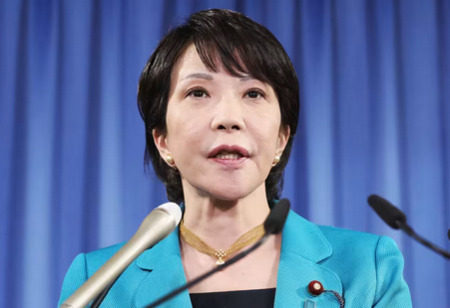
Japan Makes History as Takaichi becomes First Woman PM


Sanae Takaichi emerged victorious in the parliamentary election to become Japan's prime minister, marking a groundbreaking moment as the country's first woman leader. She obtained 237 votes in the lower house, which holds greater authority, exceeding the majority threshold by four votes necessary to secure her win. Independent lawmakers not aligned with major political parties, including Tadashi Morishima, appeared to back Takaichi's leadership campaign. Following this outcome, she also succeeded in winning the subsequent upper house runoff election.
Takaichi's rise to the prime ministership represents a milestone achievement in a nation historically characterized by limited women participation in politics. Having reached this significant accomplishment, she must now confront numerous obstacles including ongoing inflation pressures, challenging security conditions, and underlying domestic political tensions.
Also Read: Bank of Thailand Intervenes to Slow Currency Moves
Her immediate priorities include forming a cabinet, which she plans to announce later on Tuesday. Additionally, she will need to handle several diplomatic engagements in the upcoming period, notably US President Donald Trump's scheduled visit to Japan the following week.
During the two and a half weeks since Takaichi took control of the governing Liberal Democratic Party, she has already managed the surprising departure of Komeito, their long-standing coalition ally spanning several decades. Subsequently, she established a fresh alliance with an opposition faction known as the Japan Innovation Party, also called Ishin.
Also Read: Can The Future of Plastics Be Eco-Friendlier? Terrestrial Insects Show the Path
While Ishin's backing secured Takaichi's path to the prime ministership, the coalition remains two seats away from holding a lower house majority. This situation raises concerns about her ability to maneuver through parliamentary politics to obtain the necessary support for passing legislation and budgets.
She has begun efforts to consolidate party unity by reportedly offering significant positions to her primary competitors, with Shinjiro Koizumi potentially becoming defense minister and Toshimitsu Motegi taking the foreign minister role, based on media sources.
Simultaneously, she is demonstrating her more economically assertive approach by reportedly selecting Satsuki Katayama to serve as Japan's inaugural woman finance minister.
Her economic philosophy aligns closely with that of former Prime Minister Shinzo Abe, who promoted a reflationist strategy called "Abenomics." Takaichi has consistently supported increased government expenditure to stimulate Japan's economic expansion and has been critical of the Bank of Japan's monetary tightening measures.
Throughout her campaign for Liberal Democratic Party leadership, she adopted a more centrist position, acknowledging the importance of fiscal responsibility and stating she would defer monetary policy details to the BOJ. However, following her win, the yen has declined and equity markets have risen amid anticipations of economic stimulus and expectations that the central bank will avoid interest rate increases.
Also Read: Is Carbon Tax the Way Forward for Thailand to Meet its Carbon Neutrality Goals?
The yen's depreciation could worsen inflation, which has become a primary issue after voters penalized the LDP in recent national elections for their inability to control rising living expenses. This presents a challenge for Takaichi should she choose to pursue policies reminiscent of Abenomics.
The LDP has additionally committed to examining certain policies promoted by Ishin as a means of incorporating the party into the coalition. Among these is the evaluation of a temporary two-year reduction in sales tax specifically for food items. Although this represents a more economical option compared to implementing tax cuts universally, it carries inherent political dangers. Historically, administrations have faced significant resistance when attempting to increase taxes, even with predetermined timelines established beforehand.
Takaichi's success on Tuesday further demonstrates Japan's rightward political movement, reflecting growing public discontent regarding the perception that quality of life fails to match international standards, the increasing presence of foreign nationals within Japan, and anxiety surrounding escalating regional security challenges.

